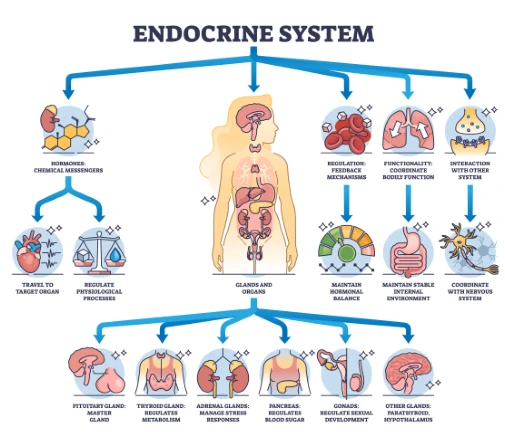Authored by Terrence Shenfield MS, RRT-ACCS, RPFT, NPS, AE-C
The human body is an amazing network of systems, all working in perfect harmony to ensure you can grow, move, and thrive. At the center of this intricate balance lies the endocrine system, a vital network of glands that produce hormones to regulate everything from mood and metabolism to reproduction and growth.
But what happens when this delicate balance is disrupted? Hormonal imbalances can significantly impact your health and well-being, often leading to fatigue, stress, and potential long-term conditions. To stay healthy, understanding how your hormonal system works is essential.
This endocrine system guide explains the system in detail, provides hormonal health tips, and highlights how proper lifestyle choices can optimize your health.
What Is the Endocrine System?
The endocrine system, often called the "body's command center," is a collection of glands that release hormones into your bloodstream. These chemical signals act as messengers, instructing different organs and tissues on how to function.
Key Glands in the Endocrine System
- Pituitary Gland
Located at the base of your brain, the pituitary gland is often called the "master gland." It controls the activity of most other glands in the endocrine system.
- Thyroid Gland
Found in the neck, this gland regulates metabolism, energy levels, and growth.
- Adrenal Glands
These sit atop your kidneys and release adrenaline and cortisol, essential for managing stress and energy use.
- Pancreas
Not just for digestion, the pancreas also regulates blood sugar through the production of insulin.
- Ovaries/Testes
These glands release sex hormones like estrogen, progesterone, and testosterone, responsible for reproduction and development.
Each gland plays a unique role, yet the system functions collaboratively to maintain balance and harmony. Learn more about these glands on the ATECAM Health Knowledge Center.
Why Is Hormonal Health Important?
Hormones affect nearly every aspect of your life. From the quality of your sleep to how your body processes food, they are constantly working behind the scenes. A disruption in this network can lead to various symptoms and conditions.
Signs of a Hormonal Imbalance
- Unexplained fatigue
- Sudden, unintentional weight gain or weight loss
- Persistent mood swings or irritability
- Low libido or irregular menstrual cycles
- Acne or hair loss
Neglecting hormone health can contribute to serious issues like diabetes, adrenal fatigue, and thyroid disorders. Understanding hormones empowers you to take actionable steps toward maintaining balance.
5 Hormonal Health Tips to Keep Your Endocrine System in Check
Balancing hormones doesn’t have to be complicated. Implementing these simple practices can help your endocrine system thrive.
1. Follow a Balanced Diet
Nutrition plays a crucial role in hormone regulation.
- Include plenty of leafy greens, cruciferous vegetables, and foods high in omega-3 fatty acids like salmon and flaxseeds.
- Avoid processed foods and excess sugar, as these can lead to hormonal spikes and crash cycles.
- For a tailored nutritional plan, visit ATECAM's Holistic Wellness Resources.
2. Exercise Regularly
Physical activity balances cortisol levels and boosts your body's ability to regulate insulin.
- Engage in activities like yoga, weight training, or brisk walking for at least 30 minutes daily.
- Avoid over-exercising, as it can elevate stress-induced hormonal reactions.
3. Manage Your Stress
Chronic stress can wreak havoc on your endocrine system by overstimulating cortisol production.
- Develop mindfulness techniques like meditation or breathing exercises.
- Step away from screens and take breaks throughout your day to reset.
4. Prioritize Sleep
Your body resets its hormonal levels during deep sleep stages. Without adequate rest, your hormones can fall out of sync.
- Aim for 7-9 hours of uninterrupted sleep each night.
- Establish a nightly routine and create a sleep-friendly environment (think dim lighting and eliminating digital distractions).
5. Consult a Professional
Sometimes, you need more tailored advice. Routine hormone level testing or consulting with a specialist can offer insights into underlying imbalances.
ATECAM offers in-depth guides and professional resources to help you on your health journey. Explore more at ATECAM’s wellness portal.
Hormonal Health Through Every Stage of Life
Your body’s hormonal needs change over time, making it essential to adjust your habits as you age.
Childhood and Adolescence
During growth and puberty, hormones influence physical and emotional changes. Encourage healthy eating and regular physical activity to set a strong foundation.
Adulthood
For adults, hormones regulate processes like reproduction and metabolism. Regular wellness checks are key, whether you're managing the demands of pregnancy or the challenges of stress.
Later Years
Aging impacts hormones such as estrogen (in women) and testosterone (in men). Supporting your body with phytonutrient-rich foods, exercise, and supplements tailored to seniors can ease transitions like menopause or low energy.
Make Hormonal Wellness a Priority
Your endocrine system explained: It’s the core of life! Taking care of your hormones allows your body to work efficiently and keeps you feeling at your best.
Start by educating yourself further. Visit ATECAM’s Knowledge Center for trusted, evidence-based insight and tools.
Take your first step toward balanced health today!
References
- National Institutes of Health (NIH) - "Guidelines for Endocrine System Maintenance."
- Mayo Clinic - "Understanding Hormonal Health and Its Impact."
- ATECAM - "Endocrine System Overview and Resources."
- Harvard Health Publishing - "Managing Stress for Better Hormonal Balance."
- Journal of Nutrition and Endocrinology - “Dietary Approaches to Endocrine Health.”



